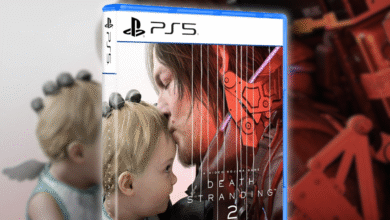Inside Pedro Pascal’s Emotional Return to ‘The Last of Us’

Note: This episode contains spoilers for The Last of Us season two episode six.
Pedro Pascal‘s return to HBO’s The Last of Us in a flashback-filled episode packed an emotional wallop, filling in several blanks in Joel and Ellie’s (Bella Ramsey) tumultuous relationship. Starting with a look at Joel’s abused childhood, a series of sequences followed, set during Ellie’s birthdays — since the duo settled in Jackson — and showing what went down on the porch the night before Joel’s murder.
The scenes throw all sorts of complex lighting into previous events, but perhaps most simply, they remind the audience of Joel’s extraordinary level of caring for Ellie — showing that the two had started down the road of reconciliation before Abby (Kaitlyn Dever) changed their fates forever.
Below, Neil Druckmann — who co-wrote the PlayStation game The Last of Us Part II and serves as a showrunner on The Last of Us, directing this week’s episode — discusses some of the hour’s pivotal moments and tangled moral and emotional quagmires.
This might be one of those rare episodes of TV where people cry repeatedly through the hour, not just in one key moment.
Well, I’m glad it worked for you. Just to see Pedro and Bella one more time; to see their happiest they’ve ever been, maybe the saddest they’ve been with each other, and the angriest they’ve ever been. And it was such a joy to explore all those nuances along the way.
I’m extremely proud of how it turned out, and I was really nervous. That porch scene, especially, means so much to myself, to my co-writers on this episode, Craig [Mazin] and Haley [Gross], and to everyone that worked on the game and the show. But specifically, when I was working on this episode, I had two people on the front of my mind, which were Ashley Johnson and Troy Baker, who originally played these characters in the game. They gave such brilliant performances for very similar scenes that I wanted to honor what they’ve done, because they helped create those characters.
I just re-watched the game version of scene (watch it below). For this, I was particularly caught by Ellie asking Joel those questions that had been on her mind for so long, and the choice to just have Joel just be silent and nod.
In the game, Ellie asked those questions at a different point. Here we took several flashback scenes and collapsed them into the one on the porch. So Ellie has to understand what Joel has done, get angry at him, and then move towards forgiveness — all within one scene. I thought Bella gave a beautiful performance. I can’t imagine how difficult that would be.
And I remember the day of shooting, I pulled Pedro and Bella aside and mentioned how important the scene is and how powerful it can be, and how important it is for their characters. Specifically, “This is your last conversation with each other. You’ve been withholding all this stuff, all these questions, so hold nothing back.”
If you watch Bella’s Ellie this season, she wears more of a mask than Ashley’s Ellie in the game. Here, the masks are fully off. And now Joel knows that she knows, and the last gift he can give her is to give her the truth. And since they were “yes or no” questions, it felt like he wouldn’t even need to say it, he could just nod or shake his head.
One thing that fascinates to me about this season is the structure, which is obviously taken from the game, as well, where you lose Joel, and then have these flashbacks and each one changes how you view their relationship and his death, though they’re much more spaced out.
Yeah, let me talk to you about our thought process. You’re right that in the game, these scenes are spaced out, sometimes hours apart. If we spaced out these scenes and planted them throughout the season, I believe they wouldn’t land as powerfully because they’re short moments and work better when they’re next to each other and you can just see the comparison — it’s like their relationship is slowly deteriorating. If we put one in an episode, and then you have to wait a week to see the next, you have to remember what the last one was, and then wait another week again. I think the show would start feeling like it has a template — “What’s the Joel flashback this week?”
Also it was important that the audience, like the characters, miss Joel. So we would kill him early in the season, we decided not to show him back until close to the end of the season. Then it became a question of where should it land. It felt appropriate to land after Ellie has just committed the darkest, most violent act she’s ever committed in her life — torturing an unarmed woman to try to get information about where Joel’s killer is hiding. There’s a contrast of “look how far this character has come.” They’re almost unrecognizable in that scene. Here’s our reminder of who they were, and what they’re fighting for — the memory of this person.
That makes a lot of sense. I did wonder if there was a part of you that would have been tempted to hold the porch moment to the series finale, and also wondered if the pragmatic issue of not having Pascal signed beyond season two might have factored into that.
No, but let’s assume we could shoot it and hold it and reveal it later. Craig brought this up to me and I bought into it immediately: He [pointed out] that when you buy the game, you have the entire story. You could play for the whole thing in two days. We have to take into account that the story is being delivered week by week, season by season, with more story coming potentially years later. There would be a high risk of the porch scene not landing if he held onto it.
When I was looking at the porch scene, one of the comments read: “Ellie’s vengeance wasn’t just about killing the people who took Joel from her, but about taking revenge on them for taking away her chance at forgiving him.” Is that true, do you think?
I agree with that interpretation, because we get to see that Joel hurt Ellie maybe the worst way possible — by taking the choice away from her to honor the people that died on her journey to be delivered to the Fireflies. Ellie’s so angry, and she means it when she says, “I don’t know if I could ever forgive you for that, but I would like to try.” She wanted to move towards that forgiveness, because I think she understood that — as much as Joel hurt her — his motivation was unconditional love, and she shares that unconditional love for him. Now she can never get the chance.
Oddly enough, the simplistic reaction I had to watching the scene was relief — “Oh, they weren’t in quite as bad of a place, relationship wise, when he died as we thought.” There is something oddly reassuring about that.
It’s bittersweet because he was finally honest with her and they confessed their love to each other on in that scene, but they never moved back to when we saw them at their happiest at that Space Museum.
Speaking of which, the rocket ship scene was one of my favorite cutscenes from the game. What did that scene mean to you?
I’ve always liked that Ellie is fascinated with our world, that things we take for granted are like fantasy to her. And by the way, that quality of Ellie came from Ashley Johnson. She loved the idea of wanting to be an astronaut. So I wrote that to make Ellie more like her and now it has remained all the way through for another actor to reinterpret it. To me, it speaks to how children can just tap into their imagination and picture they are somewhere else. Ellie wants something that she could never have in this world, and Joel kind of gives it to her.
Joel is so amazing in this episode as the World’s Greatest Apocalypse Dad that it also caused me to feel some annoyance at Ellie — like, “How can you not appreciate this man more than you do?” Though I also understand that she’s at an age where you naturally pull away from your parents and if there aren’t things to be correctly mad about, you’ll find reasons anyway. And, obviously, he was not perfect.
There are several big lies my parents have told to me that only now, in my forties, I’m able to forgive and move past because I see their motivations were in the right place. And now, as a dad myself, I had this feeling of like, “I know how to raise my kids better than my parents. I’m always going to be completely honest.” And there was a moment in time where I was too honest with my daughter when she was too young and it was about something violent and dark, and she was traumatized by it. It speaks to the complexity of being a parent and how difficult it is — even when you’re doing the right thing, you might be causing your kids to hate you. That’s the choice of the job.


